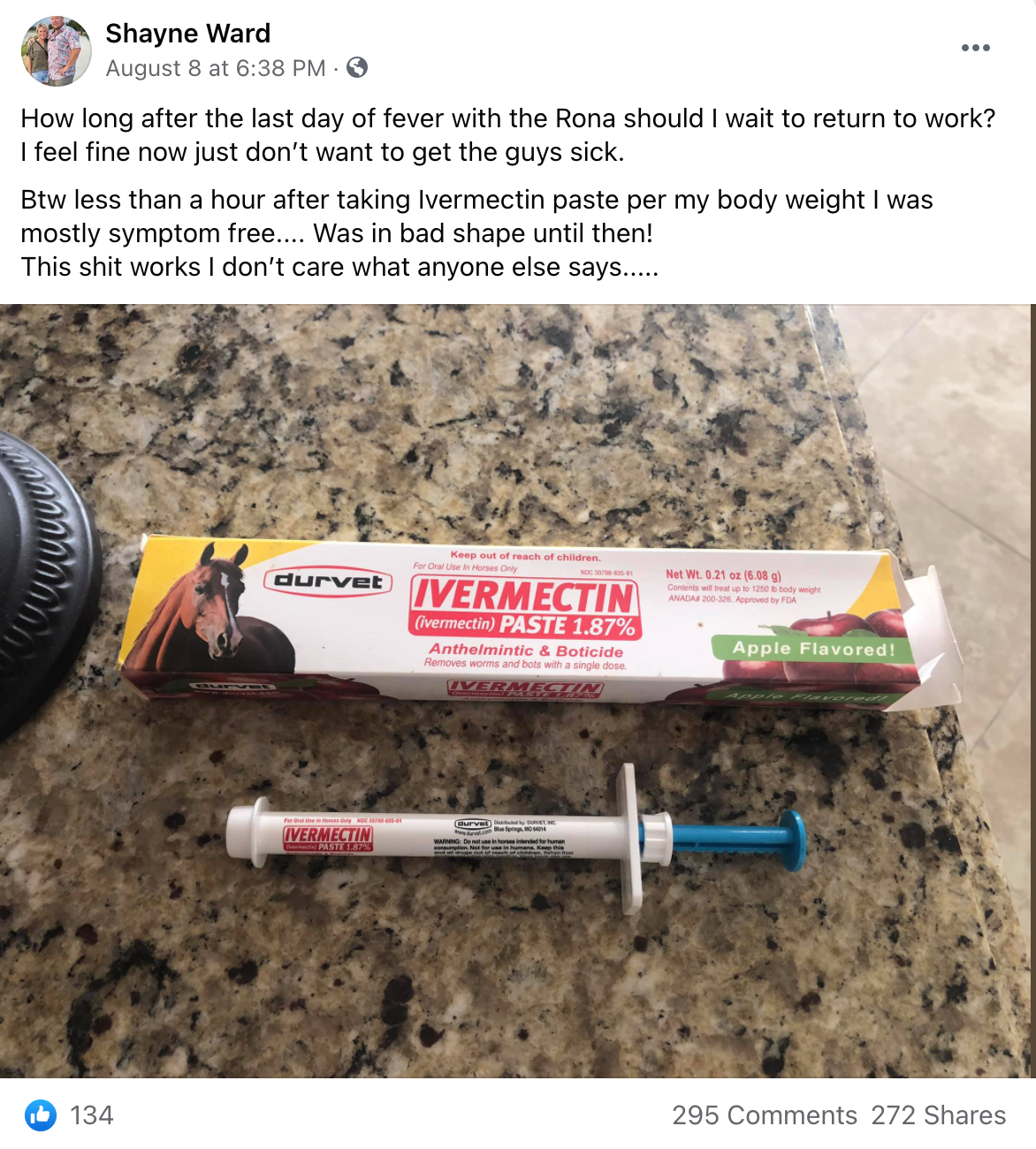Why is Joe Rogan taking animal dewormer ivermectin to treat Covid?
Comedian, commentator and podcast host Joe Rogan has said he has taken the animal dewormer ivermectin to treat coronavirus, despite official warnings against using it.
Rogan announced on an Instagram video that he had tested positive for Covid-19 after feeling "very weary" and suffering from fevers and sweats.
He said he "immediately threw the kitchen sink at it", turning to a range of treatments including ivermectin, an animal dewormer that is gaining traction on social as a cure for the virus, despite health bodies urging people not to use the unproven drug.
The use of ivermectin has attracted concern from health bodies, which have issued warnings against using the drug. The US Food and Drug Administration (FDA) even told people: "You are not a horse."
In his video, Rogan said after three days of his combination of treatment, including ivermectin, he felt "great", adding: "I really only had one bad day".
His video could add weight to the argument by some that ivermectin is a legitimate treatment for coronavirus, despite warnings from health experts.

What is Ivermectin?
According to the World Health Organisation (WHO), ivermectin is a broad spectrum antiparasitic agent, included in the WHO's essential medicines list for several parasitic diseases.
It is used in the treatment of onchocerciasis (river blindness), strongyloidiasis and other diseases caused by soil transmitted helminthiasis. It is also used to treat scabies.
Ivermectin is often used in the US to treat or prevent parasites in animals, according to the FDA, and is commonly used as a dewormer for horses.
Why are people taking Ivermectin to treat Covid?
Tales of ivermectin helping to treat Covid have been spreading on social media sites, especially on sites including Reddit and Facebook, where people have been sharing what they claim to be the cure for coronavirus symptoms.
The post above has been flagged by Facebook with the message: "Missing context. Independent fact-checkers say that this information could mislead people."
Another post touts the use of the anti-parasitic said in a post visible here: “I posted that I’m taking ivermectin for protection from Covid. Several asked about how I was taking it. Several asked, how Much do you take? I’m using the liquid that you can get at Tractor Supply.”

Ivermectin has been widely promoted by right wing figures in the US in particular, with media personalities including Fox News hosts Tucker Carlson, Sean Hannity, and Laura Ingraham mentioning the drug as a possible treatment.
In addition, a study was also published on the Research Square website in November suggesting the treatment was effective against Covid-19.
But the pre-print study, led by Dr Ahmed Elgazzar from Benha University in Egypt, was withdrawn from the website in July due to "ethical concerns" about the research.
There are, however, examples of the drug being used to treat Covid.
Earlier this year, the Indian states of Goa and Uttarakhand said they planned to use the anti-parasitic drug to protect against severe Covid-19 infections. It has also reportedly been promoted for use across Latin America and in South Africa.
What do health bodies say?
Health bodies have strongly urged people not to use the drug until it has been approved as a treatment for coronavirus.
In March the WHO recommended against using ivermectin in patients with Covid-19 except for clinical trials, because of a lack of data demonstrating its benefits.
The recommendation followed a statement from the European Medicines Agency’s (EMA) warning against the drug.
The FDA has also recommended ivermectin should not be used to treat or prevent Covid-19, sharing advice in a tweet with the caption: "You are not a horse. You are not a cow. Seriously, y'all. Stop it."
You are not a horse. You are not a cow. Seriously, y'all. Stop it. https://t.co/TWb75xYEY4
— U.S. FDA (@US_FDA) August 21, 2021
More recently, the US Centres for Disease Control and Prevention (CDC) issued a health advisory about ivermectin.
It said: "During the Covid-19 pandemic, ivermectin dispensing by retail pharmacies has increased, as has use of veterinary formulations available over the counter but not intended for human use.
"FDA has cautioned about the potential risks of use for prevention or treatment of Covid-19. Ivermectin is not authorized or approved by FDA for prevention or treatment of Covid-19.
"The National Institutes of Health’s (NIH) Covid-19 Treatment Guidelines Panel has also determined that there are currently insufficient data to recommend ivermectin for treatment of Covid-19."
Watch: What you need to know about COVID-19 and the potentially dangerous ivermectin
In June, the University of Oxford said it was testing ivermectin as a possible treatment for Covid-19, as part of the government-backed PRINCIPLE study.
The university said the drug had been added to Platform Randomised Trial of Treatments in the Community for Epidemic and Pandemic Illnesses (PRINCIPLE), the world’s largest clinical trial of possible Covid-19 treatments for recovery at home and in other non-hospital settings.
Announcing its addition to the study, the university said ivermectin had shown promising results as a potential treatment in small studies in humans and would be being investigated as a possible treatment.
What are the side effects?
In its warning, the CDC said adverse effects associated with ivermectin misuse and overdose were increasing, with a rise in calls to poison control centres reporting overdoses.
The FDA warned that overdosing on ivermectin can cause nausea, vomiting, diarrhoea, hypotension (low blood pressure), allergic reactions (itching and hives), dizziness, ataxia (problems with balance), seizures, coma and even death.
It said even levels for approved uses can interact with other medications like blood-thinners.
The FDA also pointed out that ivermectin products for animals are different to those administered to people, which adds to the risk of overdose.


